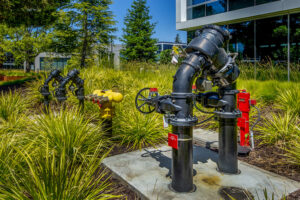
Backflow testing is critical because it ensures that your backflow prevention devices are working properly. Also, in some areas, it’s the law.
As a property owner, you may be familiar with the concept of backflow testing, a plumbing service that assesses the pressure levels of your backflow preventer device. This service is particularly important in many localities where annual testing and regular servicing of your backflow preventer device is required by law. In fact, you may receive a notice from your local government or water company requesting you to submit the results of your backflow testing.
If you are unsure of what backflow testing is and why it’s necessary, we’re here to help answer your questions. Essentially, backflow testing ensures that untreated or contaminated water is not back-siphoned into your clean water, thus guaranteeing that the water you use for drinking and showering is safe and sterile. It’s important to note that in compliance with state regulations, certified backflow testing companies must conduct annual testing. Let’s take a closer look.
What Even is Backflow?
In the plumbing world, water systems have two types of pipes: one set for carrying clean drinking water in, and another set for carrying waste out of homes and buildings. Backflow is a phenomenon that occurs when there is a disruption in the normal flow of water due to a decrease in pressure. This can cause contaminated wastewater, from sources such as toilets or hoses, to flow back into the clean water pipes instead of being carried away through the waste pipes.
Several scenarios can trigger a backflow event, such as heavy water usage from a local public source, damage to water supply lines, or pump failures. It’s important to note that an individual backflow event can affect not only your property but also your neighborhood and potentially the entire county-wide water system, so backflow problems can have far-reaching consequences for many people.
What About Backflow Preventers?
A backflow preventer is a device that is installed on your plumbing system to ensure that water only flows in one direction. It works like a check valve unit that prevents contaminated water, such as wastewater, from flowing back into the clean water supply. Some backflow preventers are mechanically powered and can automatically open and close valves to prevent backflow.
Having a backflow preventer installed is crucial for maintaining the safety and purity of your drinking water. In the event of a backflow preventer failure, contaminated water can mix with the clean water supply, leading to serious health complications
How About Backflow Testing?
Backflow testing is an essential service that helps identify any backflow issues in your plumbing system and determine their root causes. To perform proper testing, a temporary disconnection of your water service may be required. This is why it’s important to have backflow testing carried out by a certified company that can handle the disconnection process for you.
Failing to conduct regular backflow testing puts you at risk of having your water permanently disconnected, so it’s crucial to ensure that you schedule this service with a qualified professional. During the testing process, your neighborhood plumber will temporarily stop your water service and open and close the valves on your backflow device while monitoring pressure changes and taking measurements. The technician will also ensure that the system activates properly. Once testing is complete, your plumber will reinitiate your water service, fill out the necessary paperwork, and submit your results to help create a plan of action and the next steps.
Call Mahon Plumbing Today
If you still have more questions regarding your plumbing, we here at Mahon Plumbing are here to help. We have been serving the wider Baltimore area since 1994, so we have 25 years of experience to back up our fantastic service! Call us at our Baltimore location at 410-766-8566 or our Pasadena location at 410-636-7944. Be sure to keep up with us on social media by following us on Facebook or Twitter.
